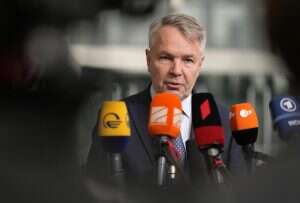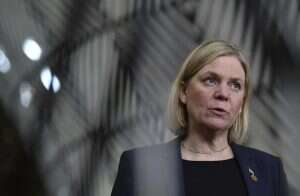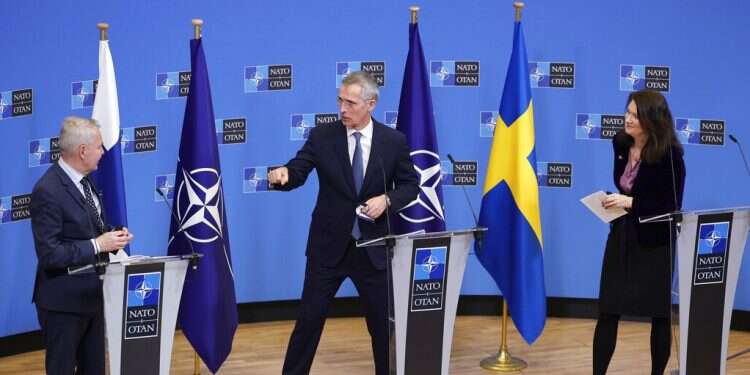Russia has made a "massive strategic blunder" as Finland and Sweden look poised to join NATO as early as the summer, UK-based The Times newspaper reported on Monday, citing US officials.
Follow Israel Hayom on Facebook, Twitter, and Instagram
The officials said that NATO membership for both Nordic countries was "a topic of conversation and multiple sessions" during talks between the alliance's foreign ministers last week attended by Sweden and Finland, the report added.
Last week, NATO Secretary-General Jens Stoltenberg said the alliance would quickly welcome Finland and Sweden into its ranks with open arms if they decided to apply, as Russia's war on Ukraine spurs public support in the two Nordic countries for membership.
The military organization might also be ready to provide security guarantees to the countries if any potential membership bid angers Russia, Stoltenberg added.
A poll last month by Finnish broadcaster YLE showed that, for the first time, more than 50% of Finns support joining the Western military alliance. In neighboring Sweden, a similar poll showed that those in favor of NATO membership outnumber those against it.
"If they decide to apply, I expect that all allies will welcome them," Stoltenberg told reporters in Brussels, as NATO foreign ministers met to discuss the war in Ukraine. "We know that they can easily join this alliance if they decide to apply."

Before launching the war on Ukraine, Russian President Vladimir Putin demanded that the 30-nation military organization stop expanding and pull its troops back from Russia's borders. So the prospect of neighboring Finland, and Sweden, joining is unlikely to be welcomed in Moscow, which has warned that their possible joining of NATO would trigger "serious military-political consequences."
For their part, Finland and Sweden have brushed off those warnings.
A statement from the Russian Foreign Ministry on Friday voiced concern about what it described as efforts by the United States and some of its allies to "drag" Finland and Sweden into NATO and warned that Moscow would be forced to take retaliatory measures if they join the alliance.
Finnish Foreign Minister Pekka Haavisto said Saturday that "we've heard this before."
"We don't think that it calls for a military threat," Haavisto said in an interview with YLE. "Should Finland be NATO's external border, it rather means that Russia would certainly take that into account in its own defense planning. I don't see anything new as such" in the statement delivered by Russian Foreign Ministry spokeswoman Maria Zakharova, Haavisto said.
Finland has a 1,340-kilometer (830-mile) land border with Russia – the longest border shared by any European Union member state and Russia.
Haavisto's words were echoed by the Finnish President Sauli Niinisto, who said on Friday that he didn't see the statement meaning Moscow was threatening Finland militarily but rather what kind of "countersteps" Russia would take should Finland join NATO.
Niinisto told Finnish media that he didn't see Zakharova's statement being any different from what she and Russian Foreign Minister Sergey Lavrov have said before on Finland's possible membership in NATO. He also noted that Putin addressed the issue with a similar tone already in 2016 during his Finland visit.

In Sweden, Prime Minister Magdalena Andersson addressed Moscow's statement in a joint news conference Friday with Sweden's military commander Micael Byden.
"I want to be extremely clear. It is Sweden that itself and independently decides on our security policy line," Andersson said.
Russia's statement came as Moscow's relations with the West sank to the lowest point since the Cold War over Russia's invasion of Ukraine.
"It's obvious that if Finland and Sweden join NATO, which is, first of all, a military organization, it will entail serious military-political consequences, which would require retaliatory steps by the Russian Federation," Zakharova said at a news briefing Friday.
Zakharova argued that while every state has a sovereign right to choose ways of ensuring its security, all members of the Organization for Security and Cooperation in Europe confirmed their adherence to the principle that the security of one state shouldn't be achieved to the detriment of another country's security.
"We view Finland's course for maintaining the policy of military non-alignment as an important factor contributing to stability and security in northern Europe and on the European continent as a whole," Zakharova said, adding that "we can't fail to see consistent efforts by NATO and some of its members, primarily the US, to drag Finland as well as Sweden into the alliance." She noted an increase of NATO drills on their territories.
Though not members, Finland and Sweden closely cooperate with NATO, allowing, among other things, the alliance's troops to exercise on their soil. Helsinki and Stockholm have also substantially intensified their bilateral defense cooperation in the past years, and secured close military cooperation with the United States, Britain and neighboring NATO member Norway.
Subscribe to Israel Hayom's daily newsletter and never miss our top stories!
Haavisto, the Finnish foreign minister, also said that Russia's invasion of Ukraine has changed public opinion on joining NATO.
"In three or four weeks we have a majority, first time ever" in favor of joining, Haavisto said.
He said Finland knows that "Russia is ready to take bigger risks, as we can see in Ukraine, bigger risks also for its own security. We can also see that Russia is capable of gathering more than 100,000 men against just one country, even without touching its reserves."
Haavisto added that "the threshold has been lowered, at least in the debate," on Russia's possible use of tactical nuclear or chemical weapons.
He too was reluctant to go into detail about any security guarantee that Finland might need, particularly as debate about joining continues at home. But Haavisto did say it's something that his country would want to discuss with "key" NATO members, and that Finnish leaders have been in contact with US President Joe Biden and Secretary of State Antony Blinken.




